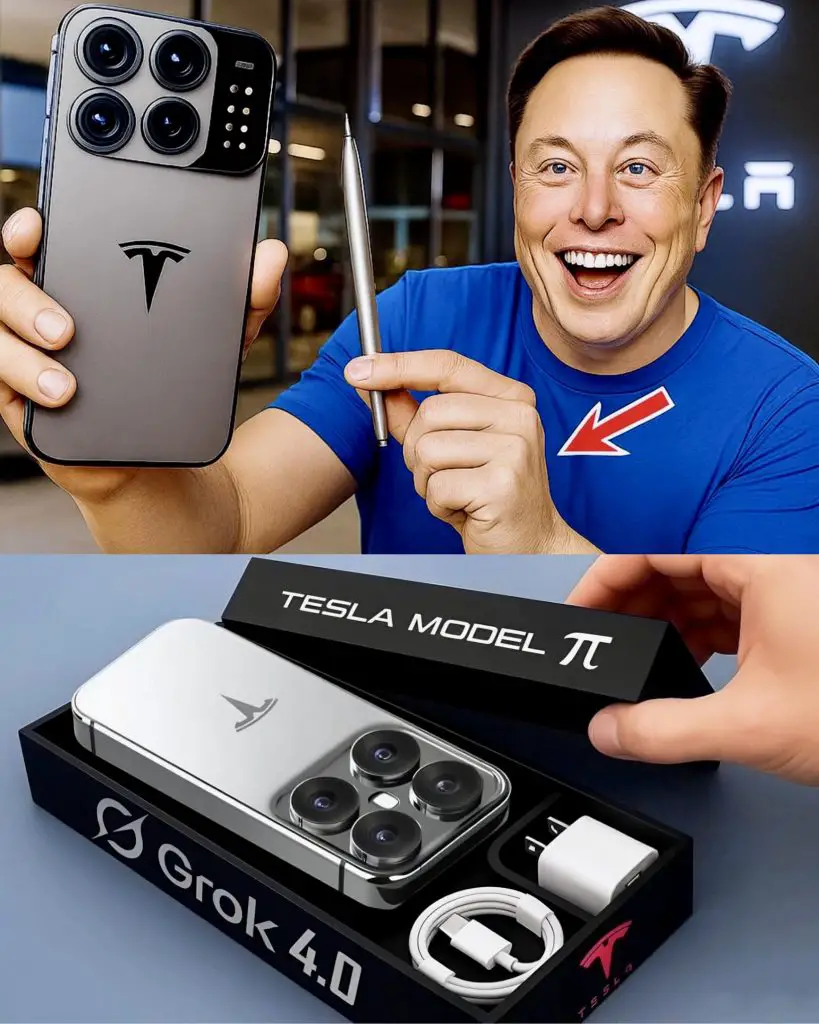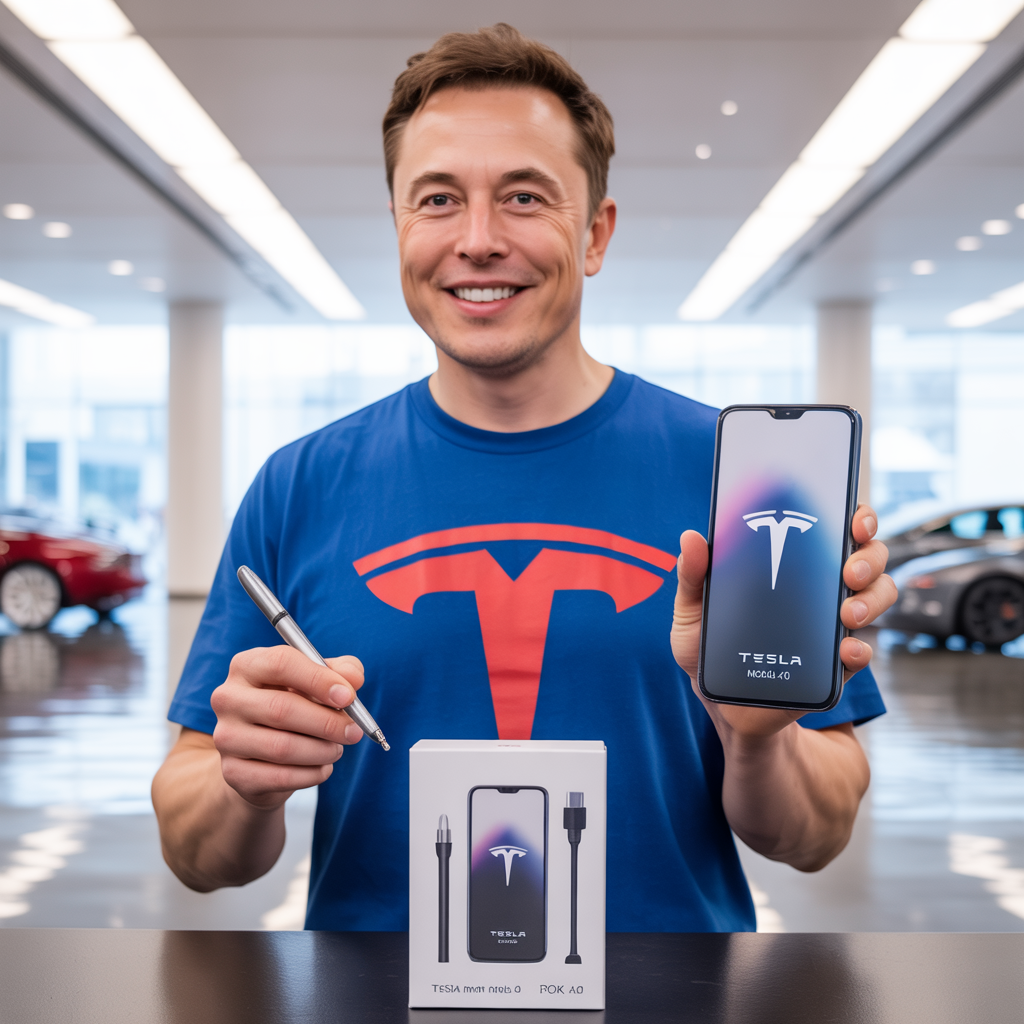In the ever-evolving world of technology, a new player has emerged to challenge the status quo. And it is not just any company. It is Tesla. Known for revolutionizing the automotive and space industries, Tesla, under the leadership of Elon Musk, is now setting its sights on something completely different—the smartphone industry.

Earlier this year, Elon Musk made headlines again, but not for rockets or self-driving cars. This time, he introduced a device that could potentially end the dominance of long-established tech giants like Apple and Samsung. It is called the Tesla Pi-Phone. And according to early reports, this device could redefine what a smartphone is capable of.
What Is the Tesla Pi-Phone
The Tesla Pi-Phone, unofficially dubbed the Model Pi or Model P, is a smartphone designed to do far more than what current devices offer. While traditional smartphones focus on minor upgrades in camera quality or processor speed each year, the Tesla phone is an entirely new concept. It is being promoted not just as a communication tool, but as an intelligent, fully integrated extension of Tesla’s broader ecosystem—one that includes clean energy, artificial intelligence, and global internet access.
One of the most groundbreaking features of the Pi-Phone is its native integration with Starlink, the satellite internet service developed by SpaceX. This means users could potentially access high-speed internet without relying on mobile towers or Wi-Fi routers. In rural areas, disaster zones, or even while traveling off-grid, the Pi-Phone promises global coverage that no other phone currently offers.
Key Features That Set It Apart
The Tesla Pi-Phone is more than just hype. From early renderings and insider leaks, several key features are already generating serious excitement among tech enthusiasts.

First is the Starlink satellite connectivity. This would allow users to access low-latency internet from virtually anywhere on Earth. While satellite internet exists today, it typically requires large equipment and external antennas. The Pi-Phone could make this technology portable and seamless for everyday users.
Second, the phone is said to include built-in solar charging capabilities. This aligns with Tesla’s mission to accelerate the world’s transition to sustainable energy. Users may be able to charge their phones using sunlight, reducing the need to plug in during the day and offering a vital power source during emergencies or remote travel.
Third, the Pi-Phone is rumored to include a Neuralink-compatible interface. Though still speculative, this would mean potential future integration with brain-computer technology. Neuralink, another of Musk’s ventures, is developing direct connections between the human brain and devices. If true, this could enable faster communication, thought-based commands, and enhanced accessibility for people with disabilities.
Fourth, Tesla’s AI system—branded as Grok 4.0 in early marketing materials—is expected to run natively on the phone. Unlike typical virtual assistants like Siri or Google Assistant, Grok is designed to be more conversational, more intelligent, and deeply integrated into the Tesla ecosystem. Imagine controlling your Tesla car, home solar panels, or even smart appliances through a single unified AI assistant in your pocket.
Finally, the design itself is striking. The device sports a minimalist, futuristic aesthetic with a premium metallic finish and quad-lens camera system, optimized for both high-end photography and AI-powered scanning features.
Disruption at an Unbeatable Price
Perhaps the most shocking part of the Tesla Pi-Phone announcement is the price point. Elon Musk revealed that the device could be available for under 170 dollars. That is less than one-third the price of a flagship iPhone or Galaxy device. For many consumers, this opens the door to cutting-edge technology at a fraction of the cost they are used to paying.
Tesla has long pursued affordability as a core goal. With electric vehicles, they introduced entry-level models to broaden access. With energy solutions, they created solar products for homeowners around the world. Now, the Pi-Phone is following the same pattern—offering advanced features, world-class design, and disruptive technology without the premium price tag.
What Does This Mean for Apple and Other Tech Giants
While Apple has dominated the smartphone market for over a decade, its recent releases have been criticized for offering only incremental updates. The Tesla Pi-Phone may be the first real competitor to seriously challenge Apple’s market dominance since the rise of Android.
If the Pi-Phone delivers on its promises—especially in satellite connectivity and solar charging—it could force a major shift in how smartphones are designed and marketed. No longer would users need to depend on cell towers, frequent charging, or expensive subscription plans.
Companies like Samsung, Google, and Huawei will likely have to respond quickly. Consumers are demanding more innovation and better value. And Tesla has proven time and again that it is not afraid to disrupt even the most established industries.
Challenges and Skepticism
As with any ambitious product launch, there are still questions. Can Tesla produce smartphones at scale, especially given global chip shortages and manufacturing complexities? Will the satellite internet actually be fast and reliable enough for everyday use on a mobile device? And how will regulatory bodies react to the idea of a globally connected phone with no reliance on local network providers?
Skeptics also point out that Tesla has made bold announcements before, with timelines that are often extended. So far, no official release date for the Pi-Phone has been confirmed, and the device shown in viral images has not been publicly demoed.
Still, if there is one thing people have learned about Elon Musk, it is this—he does not make small promises, and he usually finds a way to deliver, even if it takes time.
A Smartphone or the Start of a New Tech Era
The Tesla Pi-Phone is not just another gadget. It represents a vision. A vision where mobile technology is no longer confined by network coverage, battery limitations, or operating system silos. It is a phone that connects directly to space, charges from the sun, and speaks with intelligent software that understands its user deeply.
If successful, it could pave the way for a new generation of smart devices that are smarter, cleaner, and more independent than anything we have seen before.
Final Thoughts
Elon Musk is known for taking bold risks. He took on the auto industry with electric cars. He challenged NASA with reusable rockets. Now, he is setting his sights on the smartphone world—and the timing could not be better.
As technology becomes increasingly important in our daily lives, people are hungry for innovation that is meaningful, not just cosmetic. The Tesla Pi-Phone promises real change—faster connections, global internet, smarter AI, sustainable power, and a price anyone can afford.
If Tesla pulls this off, it will not just change the phone in your hand. It could redefine what you expect from all your technology in the years to come.
